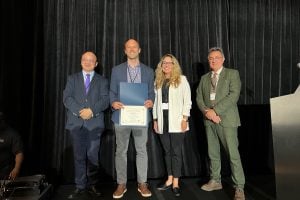
Michael Shields, associate professor in the Department of Civil and Systems Engineering (CaSE) at Johns Hopkins University, has received the Early Achievement Research Award from the International Association for Structural Safety and Reliability (IASSAR). The award was presented on June 4 during the IASSAR Awards Banquet at the International Conference on Structural Safety and Reliability (ICOSSAR) on the University of Southern California’s campus.
The award recognizes Shields’ work to better understand the effects of uncertainties and random variations on the performance of materials, structures, and systems.
“I’m honored to receive this award from a community I deeply respect,” said Shields. “Structural safety and reliability are more relevant than ever in a world facing increasingly complex risks, and I’m grateful to work with talented students and collaborators who are expanding the possibilities of scientific machine learning and uncertainty quantification.”
IASSAR is a global organization committed to advancing scientific principles of safety, risk, and reliability in engineering systems, including design, construction, and maintenance. This year’s flagship conference, ICOSSAR, brought together leading researchers working at the intersection of materials science, machine learning, artificial intelligence, and structural design. The event centered on the growing role AI plays in the characterization, assessment, and mitigation of risks from man-made and natural hazards.
A semi-plenary speaker at the conference, Shields presented recent work on scientific machine learning, or SciML, and how advances in operator learning are improving computational modeling for uncertain systems. Shields also introduced a new class of neural operators for predicting structural response—from a single beam to a multi-story building.
As the founder and leader of the Shields Uncertainty Research Group (SURG) at Johns Hopkins, he oversees methodological research in uncertainty quantification, machine learning, and stochastic methods to inform the design of resilient structures and materials capable of withstanding fire, earthquakes, blasts, and other extreme events. Shields’ work primarily focuses on problems where computational efficiency is critical and the behavior of the system is highly unpredictable, such as in civil structures, aircraft, ships, automobiles, and spacecraft.
Shields and his group also develop the open-source UQpy (Uncertainty Quantification with Python) software, which is a general toolbox and development environment for uncertainty quantification in computational, mathematical, and physical systems.
In addition to his faculty role in CaSE, Shields holds a secondary appointment in the Department of Materials Science and Engineering and is a fellow at the Hopkins Extreme Materials Institute (HEMI). He is a director of the Center on High-Throughput Materials Discovery for Extremes (HT-MAX), a leadership member of the Center on Artificial Intelligence for Materials in Extreme Environments (CAIMEE), and chair of the Johns Hopkins’ Whiting School of Engineering Faculty Senate.